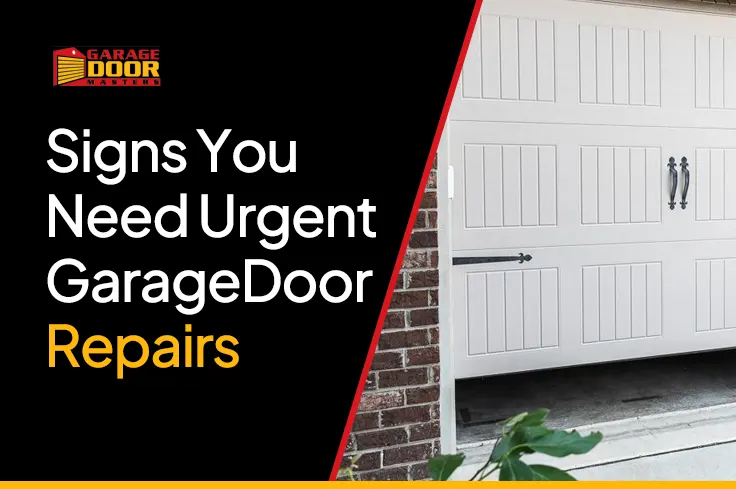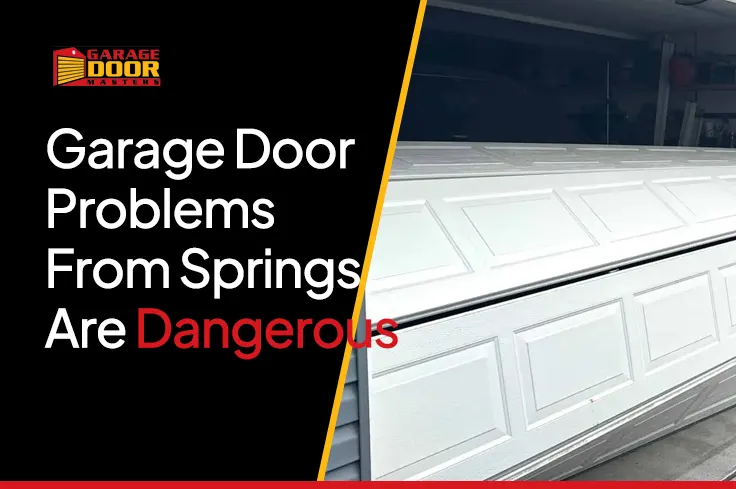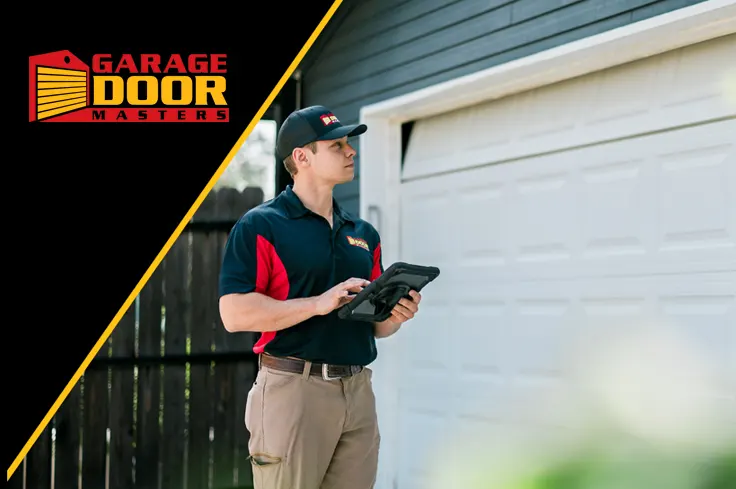You’re heading out for work, and your garage door won’t budge. Or it starts making awful grinding noises. Some problems can wait until next week, but others need attention right now.
Knowing the difference between what makes an urgent garage door repair and what doesn’t could save you from a bigger headache and a bigger bill. Let’s discuss which issues need attention today and which ones can wait for a bit.
Signs You Need Urgent Garage Door Repairs

Broken Spring Repairs Can't Wait
Springs do all the heavy lifting when your door opens and closes. When one breaks, you’ll know it. Most people hear a loud bang that sounds like a firecracker. After that, your door becomes incredibly heavy or won’t move at all.
Why Garage Door Problems From Springs Are Dangerous

Garage Door Opener Issues That Need Immediate Attention
Your opener is the brain of the whole operation. When it starts acting weird, pay attention. If the motor runs but nothing moves, something’s disconnected or broken. Sparking, smoking, or burning smells from the unit mean you should unplug it immediately and call for help.
When Opener Repair Becomes an Emergency
- The door closes on objects without reversing.
- Smoke or burning smells come from the motor.
- The opener makes loud grinding or squealing noises.
- The door randomly opens or closes on its own.
- Wires are exposed or look damaged.
24-Hour Emergency Garage Door Repair Services Near You
Same-Day Garage Door Service vs. DIY Garage Door Fixes
We get it, calling a pro costs money. But some fixes aren’t worth the risk of doing yourself. Springs, cables, and heavy panel replacements should always be handled by trained technicians. However, you may be able to handle simple stuff, like replacing weatherstripping or tightening loose bolts.
When booking urgent garage door repairs, ask about the timing. Same-day service usually means they’ll arrive within a few hours. Fast service means they drop everything and come now. Know which one you actually need before paying that premium price. Being honest about urgency saves everyone time.
Common Garage Door Panel and Installation Emergencies
Damaged panels aren’t always urgent, but sometimes they are. A small dent from a basketball can wait. A panel that’s bent so badly the door won’t close or has sharp edges sticking out needs fixing, now. Safety comes first, always.
New installation problems happen more often than you’d think. If your recently installed door isn’t working right, call the installer back immediately. Issues like improper balancing or incorrect spring tension only get worse with time. Don’t assume you need to live with it or fix it yourself.
Getting Your Urgent Garage Door Repairs Done Right
The key to handling urgent garage door repairs is knowing what’s truly urgent. Life-threatening situations, security risks, and major mechanical failures need immediate attention. Everything else can probably wait until regular business hours, when service costs less money.
Keep a local company’s number handy before you need it. When trouble hits, you don’t want to be searching online frantically. Getting urgent garage door repairs scheduled quickly matters most during real emergencies. Regular maintenance also helps prevent many emergencies in the first place. A yearly checkup catches small problems before they become big, expensive ones.
Our Experts Are Here To Help
Get a Free Quote
Frequently Asked Questions About Urgent Garage Door Repairs
How much does an emergency repair typically cost?
Emergency repair costs vary based on the problem and time of day. Spring replacements usually run $150-$300 for parts and labor. After-hours emergency service adds $50-$150 to regular pricing. Complex issues, such as garage door replacement, obviously cost more.
Most garage door technicians charge a service call fee just to come out. Get quotes from 2-3 companies if possible. But remember, fixing a broken garage now prevents bigger problems later. That initial cost beats dealing with security issues or more damage down the road.
Can I use my garage door if it's making weird noises?
Stop using a malfunctioning garage door if it makes loud noises or exhibits other issues. Squeaking might need lubricant. However, grinding, scraping, or banging sounds indicate that something’s wrong. Using a broken garage door with serious problems risks injury and more damage.
The system could fail while opening or closing. Test the safety reverse feature first. If it works and the door moves smoothly despite noise, you’re okay until morning. Otherwise, treat it as a garage door emergency and get help fast.
What counts as a real garage door emergency?
A garage door emergency involves safety risks or security threats. Doors stuck open leave your home exposed to theft. Broken springs make doors dangerously heavy. Malfunctioning sensors that fail to reverse the door can endanger kids and pets.
Doors with exposed cables or hanging off tracks need immediate attention. Smoke or burning smells from the opener qualify too. However, cosmetic damage or minor annoyances can wait. Suppose you’re unsure whether your garage door issue requires emergency service.
In that case, most companies offer phone consultations to help you make an informed decision.
Should I replace or repair my old garage door?
This depends on age and damage extent. Doors over 15-20 years old might need garage door replacement instead of constant fixes. Calculate repair costs versus new garage door prices. If repairs exceed half the replacement cost, consider upgrading. Multiple broken parts suggest the whole system is failing
A new garage door improves security, energy efficiency, and curb appeal. However, single-component failures on newer doors usually just need repairs. Garage door technicians can assess whether fixing or replacing makes more financial sense for your situation.
How quickly can someone fix my broken garage door?
Most companies offer same-day service for non-emergencies. They typically arrive within 2 to 4 hours of your call. True garage door emergencies get faster response times, often within an hour. After-hours calls cost more but get similar quick service. Simple fixes, such as sensor adjustments, take approximately 30 minutes.
Spring replacements need 1-2 hours. Complex issues, such as garage door replacement, can take longer and sometimes require return visits. Weather and tech availability also affect the timing. Call early in the day for better scheduling options. Keep a trusted company’s number saved in case of trouble.
What maintenance prevents urgent repairs?
Regular checkups catch problems early. Lubricate moving parts every 3-4 months with garage door-specific products. Test safety by reversing the monthly process, placing objects under the closing door. Tighten loose hardware twice a year, as vibration can loosen bolts. Watch for frayed cables or rust on springs.
Clean tracks and remove debris blocking sensors. Professional inspections yearly spot issues you might miss. Garage door technicians can adjust spring tension before it breaks. Replace weatherstripping when worn to prevent moisture damage.
Good maintenance extends your system’s life and reduces surprise garage door issue calls significantly.


